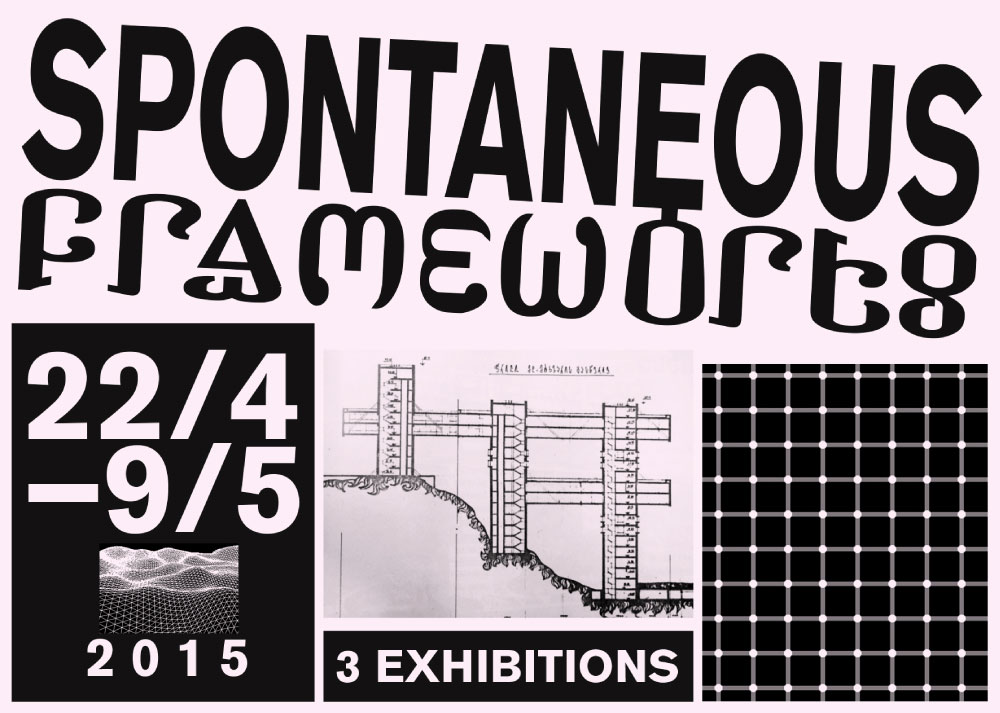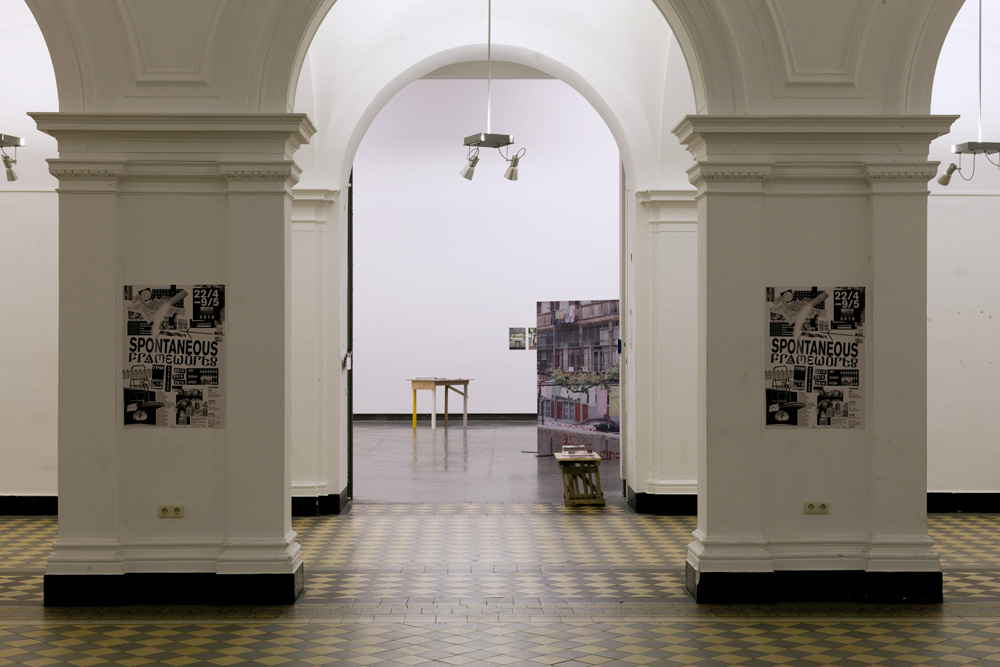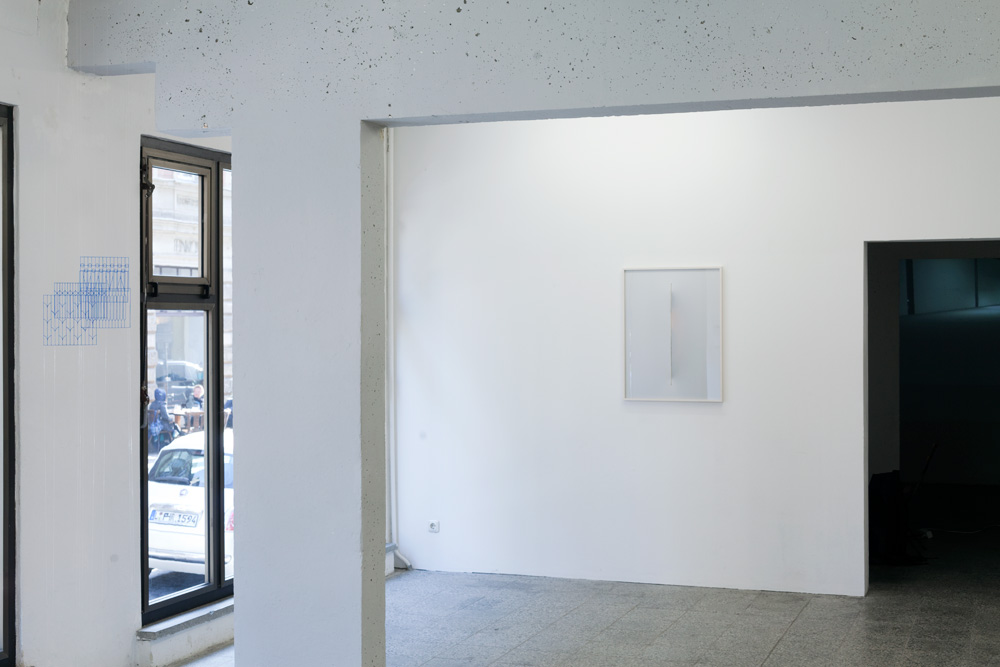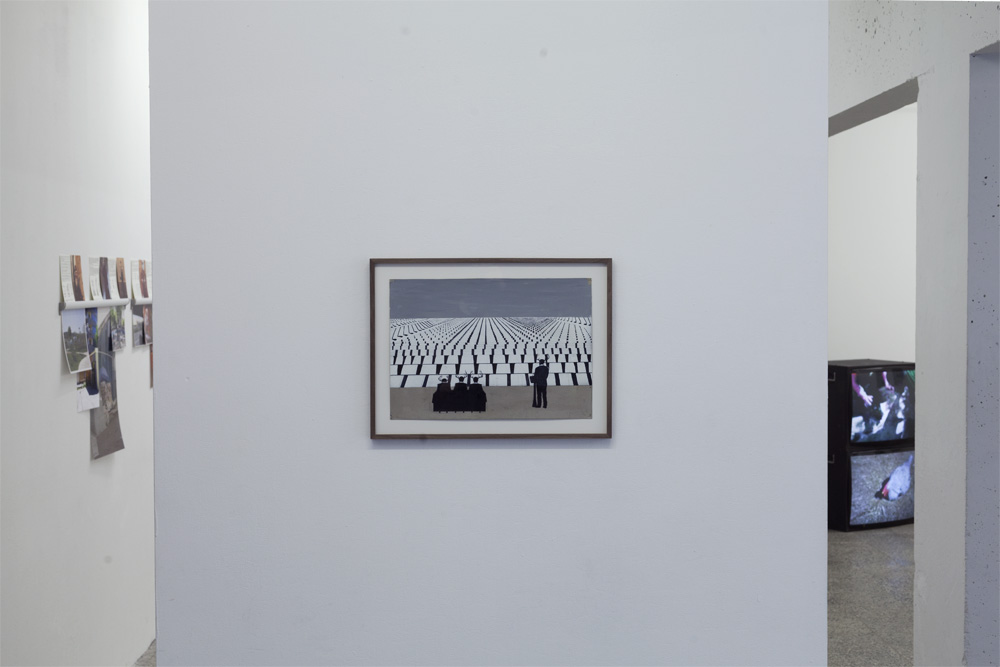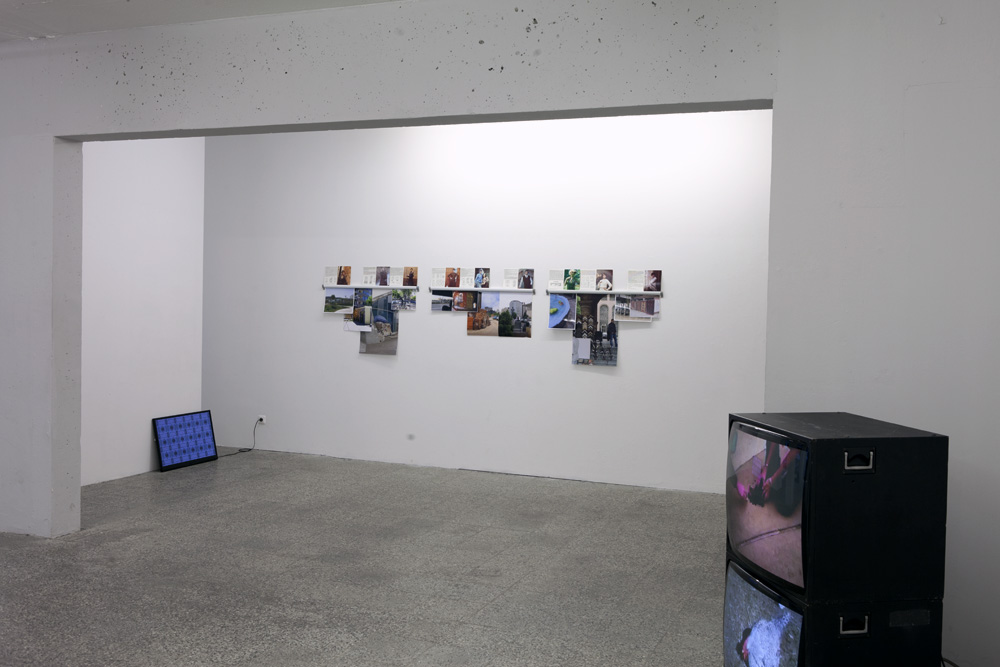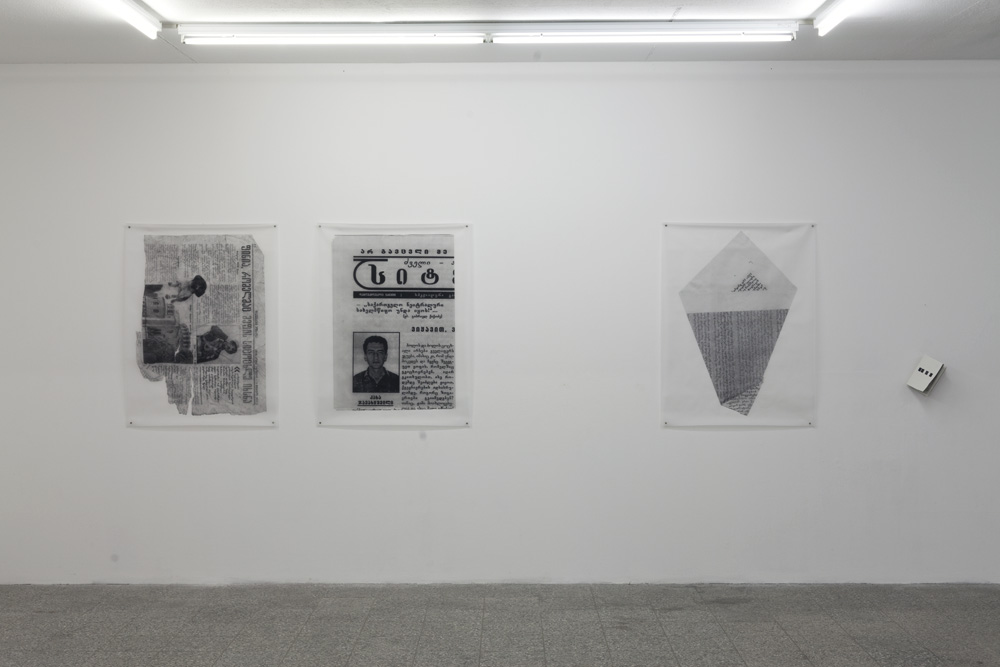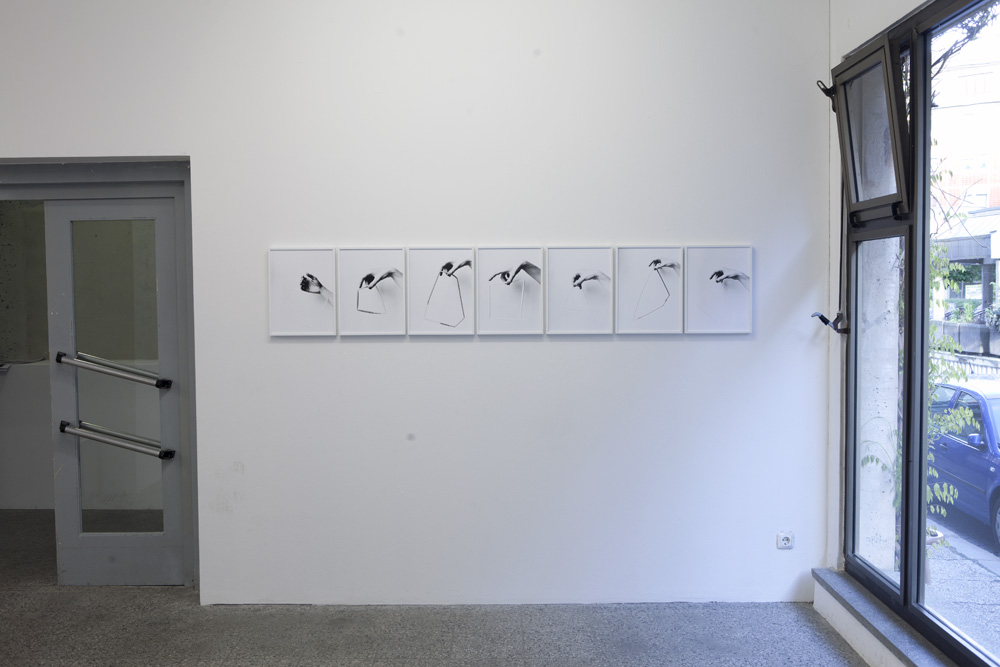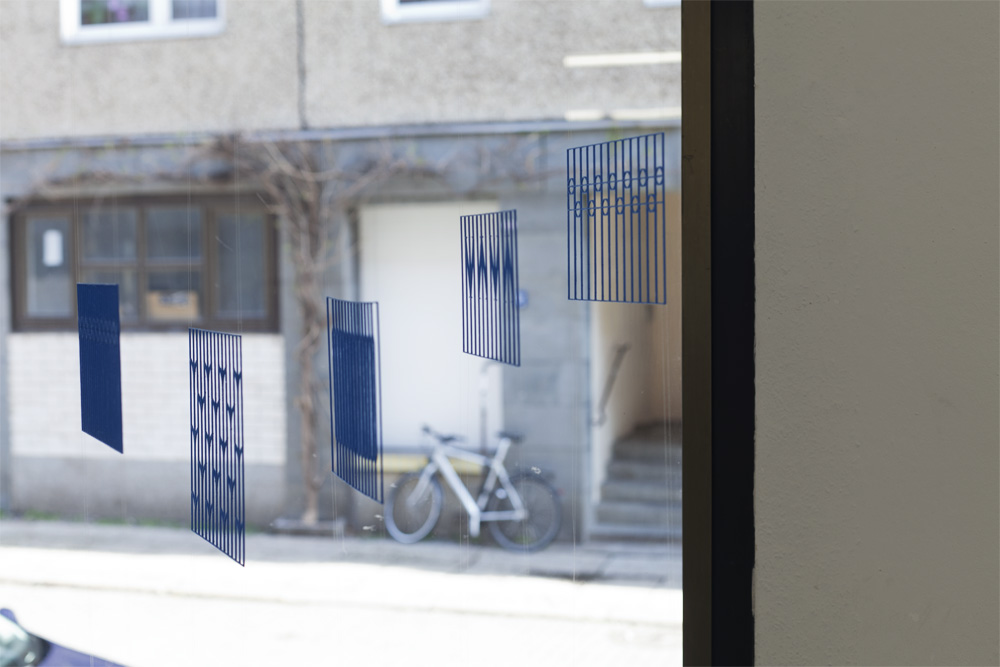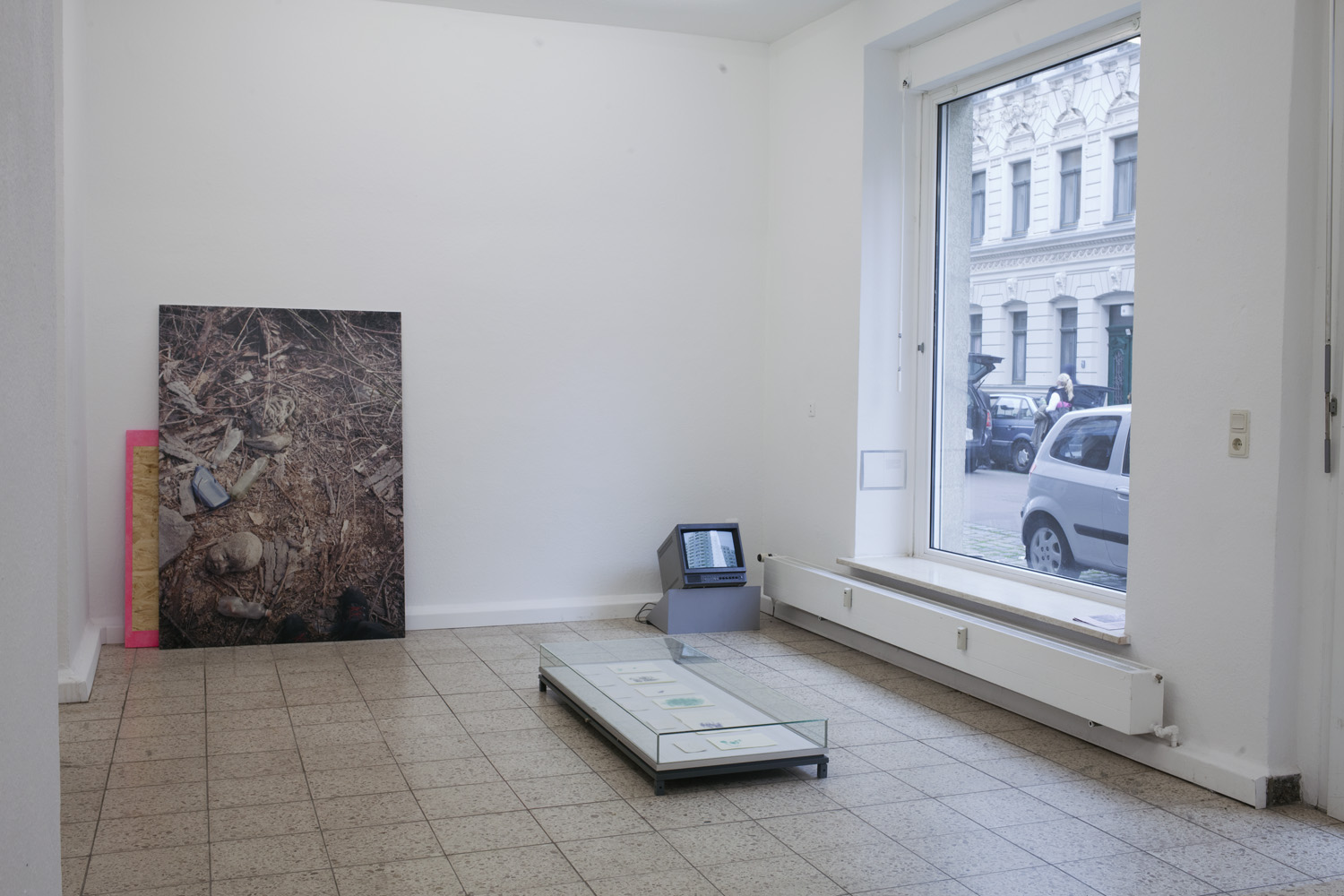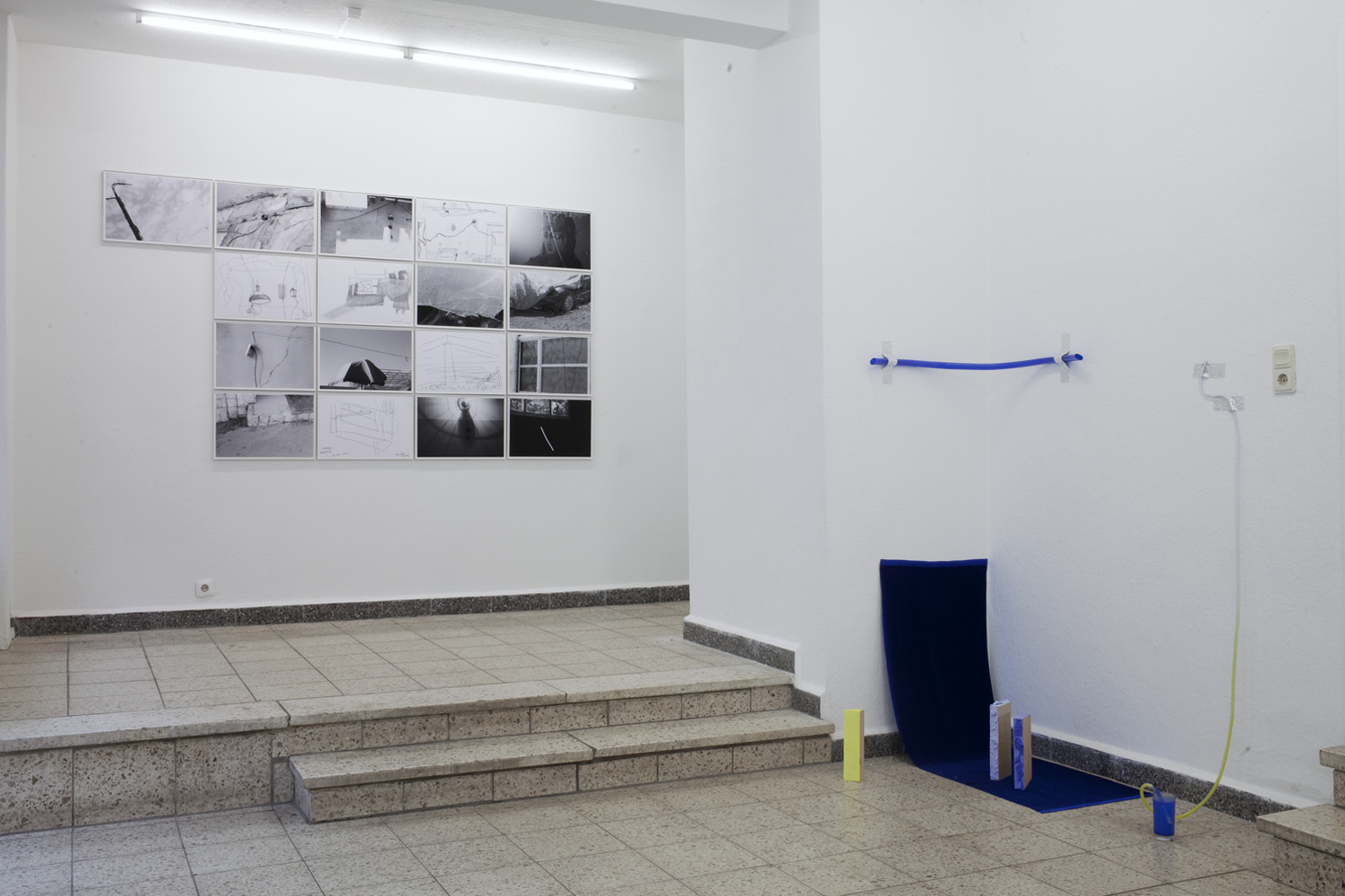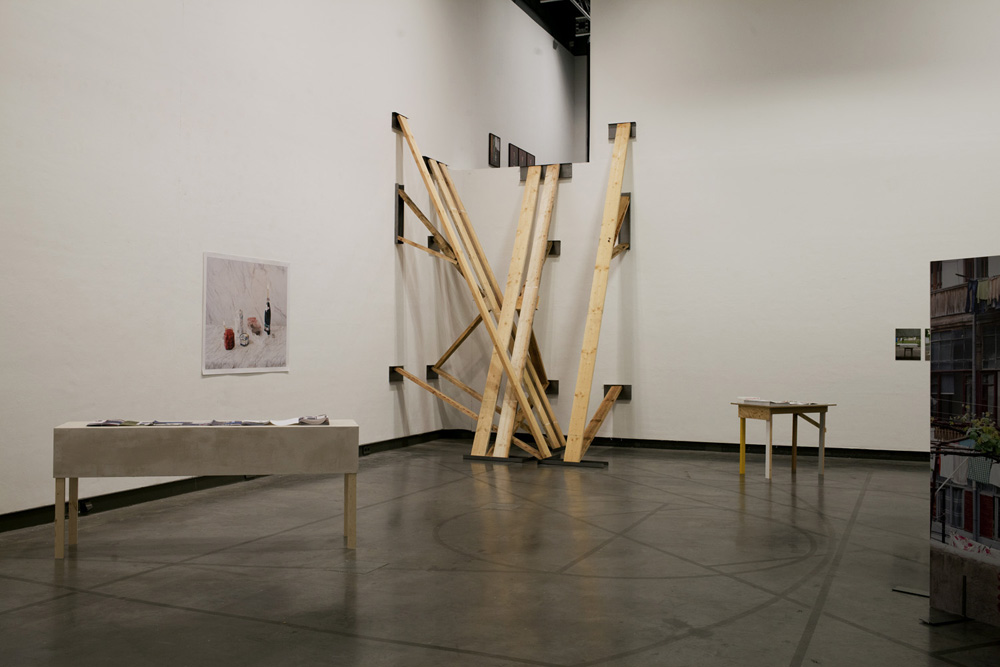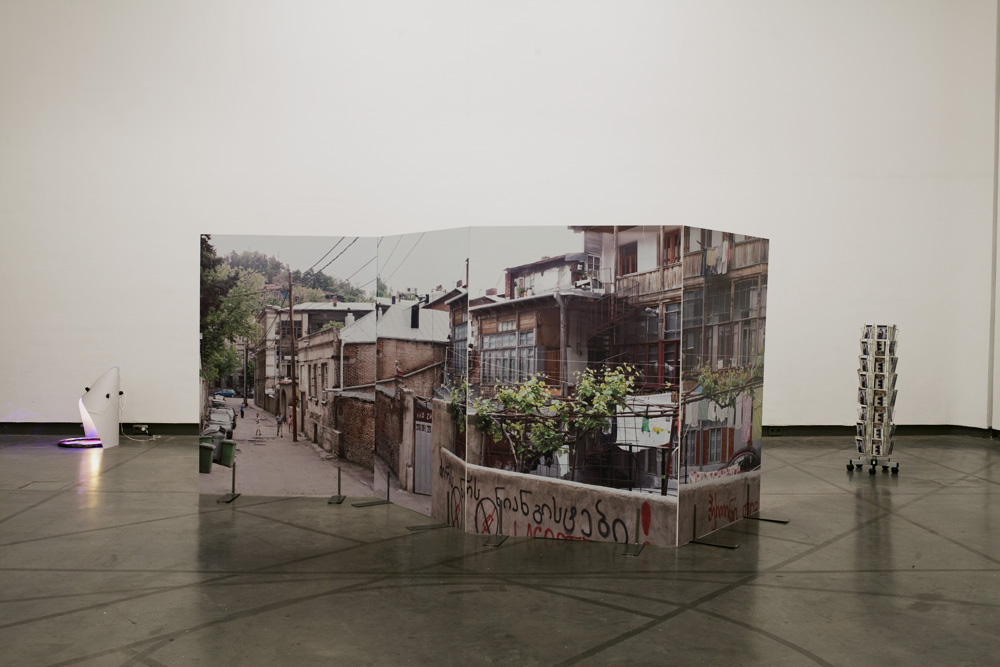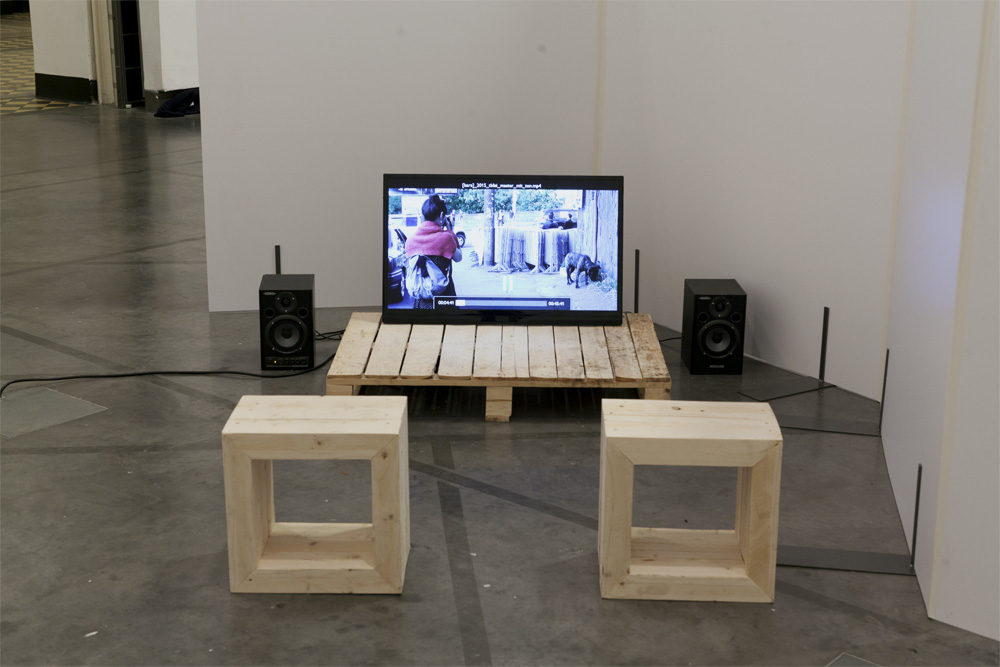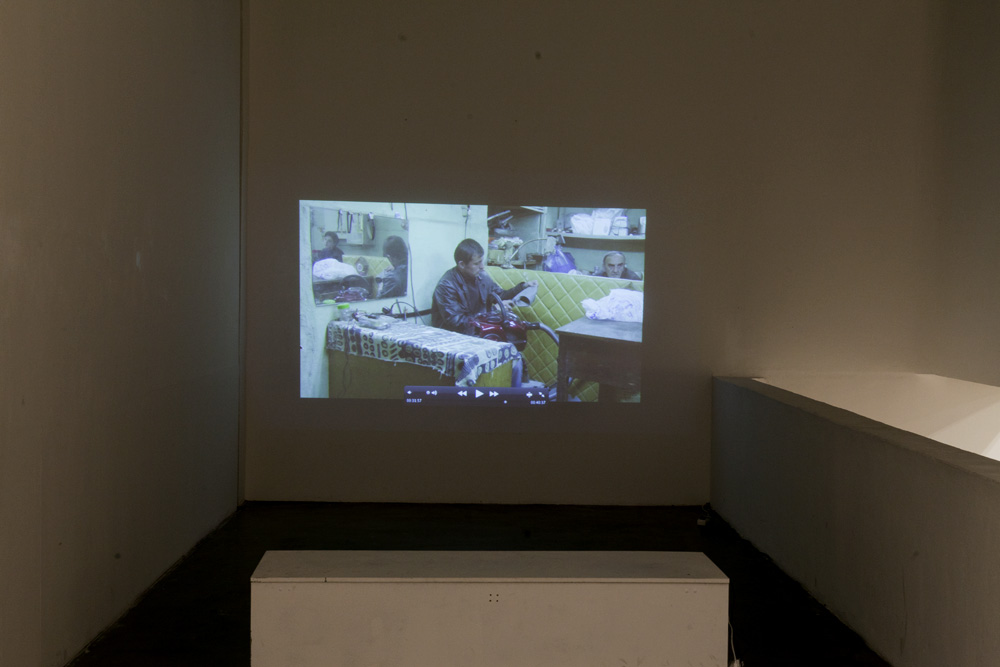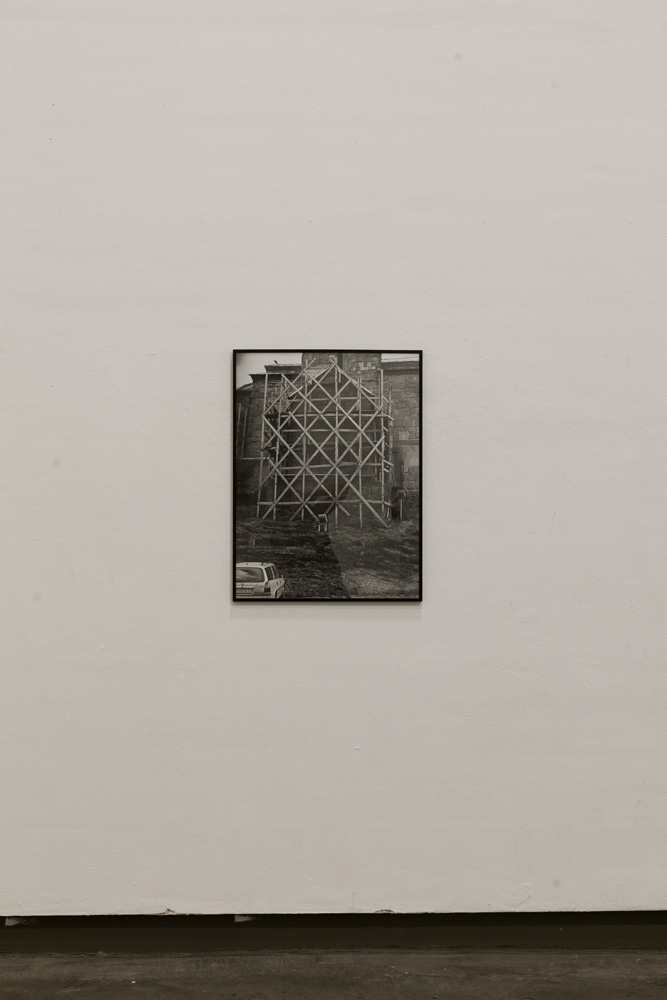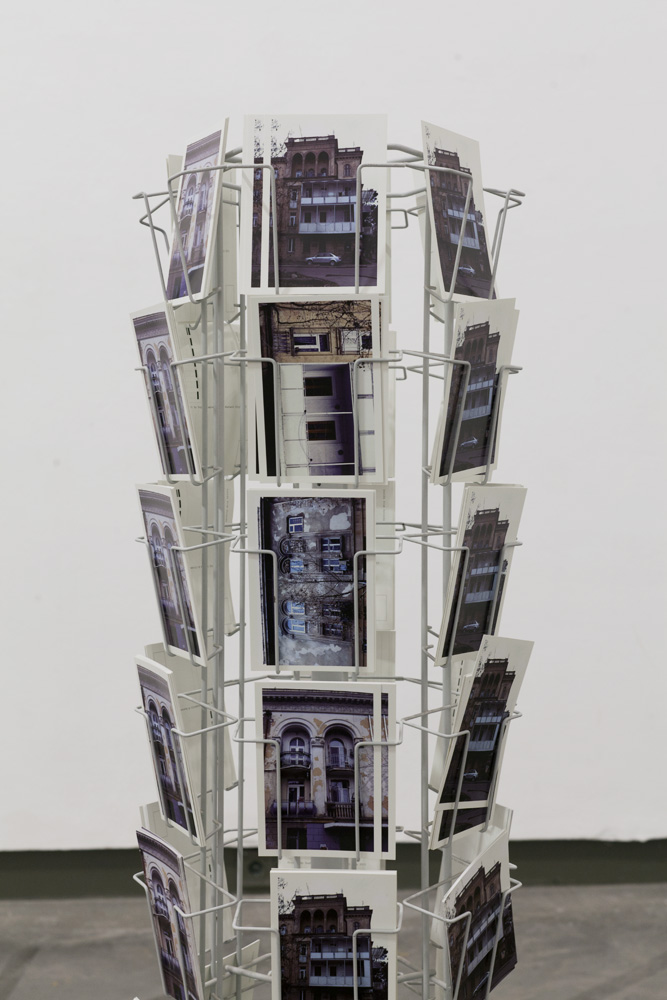Das Ausstellungsprojekt „Spontaneous Frameworks“ ist das Resultat einer Exkursion der Klasse Bara nach Tbilisi, Georgien im Mai 2014, auf Einladung von Steffi Schöne und Wato Tsereteli, Tbilisi State Art Academy, Department of Photography.
„Spontaneous Frameworks“ bestand aus 3 aufeinander folgenden Ausstellungen mit Rahmenprogramm vom 20. April bis 12. Mai 2015. Ausstellungsorte: KV-Verein für zeitgenössische Kunst Leipzig, Бükü – Büro für kulturelle Übersetzungen, Galerie der HGB Leipzig.
Die Ausstellung wurde kuratiert von Kristina Semenova (als Abschlussprojekt im Masterstudiengang “Kulturen des Kuratorischen”) in Zusammenarbeit mit Prof. Tina Bara und Anna Voswinckel.
Beteiligte KünstlerInnen:
Tina Bara, Aude Benhaim, Fine Bieler, Natalia Bougai, Caroline Böttcher, Carmen Catuti, Dali Darzhania, Denise Fragner, Nora Frohmann, Zarah Gutsch, Matthias Julian, David Kukhalashvili, Marius Land, Sophia Lapiashvili, Natalia Nieberidze, Marcel Noack, Barbara Proschak, Teresa Schönherr, Steffi Schöne, Giorgi Tabatadze, Sophia Tabatadze, Ana Chaduneli, Tamara Chaduneli, Ana Chorgolashvili, Anna Voswinckel.
- Graphic design by Teresa Schönherr
- Spontaneous Frameworks @ HGB Galerie 28.4. – 9.5. 2015
-
Spontaneous Frameworks @ Kunstverein Leipzig 22.4. – 30.04. 2015
Left: Nora Frohmann, right: Steffi Schöne
-
Spontaneous Frameworks @ Kunstverein Leipzig 22.4. – 30.04. 2015
From left to right: Anna Voswinckel, David Kukhalashvili, Giorgi Tabatadze
-
Spontaneous Frameworks @ Kunstverein Leipzig 22.4. – 30.04. 2015
Left: Anna Voswinckel, right: Giorgi Tabatadze
-
Spontaneous Frameworks @ Kunstverein Leipzig 22.4. – 30.04. 2015
Caroline Böttcher
-
Spontaneous Frameworks @ Kunstverein Leipzig 22.4. – 30.04. 2015
Barbara Proschak
-
Spontaneous Frameworks @ Kunstverein Leipzig 22.4. – 30.04. 2015
Nora Frohmann
-
Spontaneous Frameworks @ BüKü 24.4. – 9.5. 2015.
From left to right: Works by Matthias Julian, Barbara Proschak, Aude Benhaim
-
Spontaneous Frameworks @ BüKü 24.4. – 9.5. 2015
Left: Natalia Bougai, right: Tamara Chaduneli
-
Spontaneous Frameworks @ HGB Galerie 28.4. – 9.5. 2015
From left to right: Zarah Gutsch, Carmen Catuti, Fine Bieler, Marius Land, Marcel Noack
-
Spontaneous Frameworks @ HGB Galerie 28.4. – 9.5. 2015
From left to right: Dali Darzhania, Marcel Noack, Sophia Lapiashvili
-
Spontaneous Frameworks @ HGB Galerie 28.4. – 9.5. 2015
Tina Bara
-
Spontaneous Frameworks @ HGB Galerie 28.4. – 9.5. 2015
Sophia Tabatadze
-
Spontaneous Frameworks @ HGB Galerie 28.4. – 9.5. 2015
Fine Bieler
-
Spontaneous Frameworks @ HGB Galerie 28.4. – 9.5. 2015
Sophia Lapiashvili
Rahmenprogramm :
Ana Chorgolashvili (Tbilisi):
Index: Soviet Architecture in Tbilisi
Künstleringespäch mit Videopräsentationen
KV 25/04, 6 pm
After the collapse of the USSR, Soviet urban planning and development in Georgia halted, particularly in the capital, Tbilisi. At the 20th century’s end, in the period of transformations and political and economic crisis, the centralised system of civic government failed, resulting in many micro schemes. Inhabitants began constructing spaces individually; some architectural hybrids originated, becoming spontaneous segments of the city, giving the capital a new look. From the beginning of the 21st century, ’new‘ building priorities were announced in Tbilisi, resulting in a massive city wide building process. Parts of old buildings disappeared, while other parts re-colored accordingly, had lost their original look and original message. A non-systemic approach has become a new governance system. Ana Chorgolashvili will speak about her ongoing research project Index focusing on Soviet architectural heritage in Tbilisi and its post-Soviet development.
Sophia Lapiashvili (Tbilisi):
Lost Utopias in Tbilisi. Mosaics from the Soviet period
Präsentation
KV 29/04, 6 pm
Artist, curator and former coordinator of artist residency GeoAIR, Sophia Lapiashvili, presents a talk focused on the intensive changes within the public space that have been taking place throughout the last 20 years in Tbilisi, and have given rise to the interest of GeoAIR members in the monumental-decorative mosaics. Unsystematic transformation of urban environment, amateur interventions in forming the image of the city, and façade ‚beautifications‘, have led to destruction of mosaics in Tbilisi’s public spaces. This became the reason behind documenting them, creating the database and online map. Lost Heroes of Tbilisi. Soviet Period Mosaics was a part of the SPACES project, funded by the European Union through the Eastern Partnership Culture Programme.
Sophia Tabatadze (Berlin/Tbilisi):
PIRIMZE: A Place transforming to a Non-Place
Vortrag/Lecture,
KV 29/04, 7 pm
Artist and founder of artist residency GeoAIR, Sophia Tabatadze presents a talk on her three years of research into social and visual changes affecting Pirimze, a six-floor edifice from the Soviet era, built especially to house repair and maintenance services. The theme unfolds to a broader picture and shows what has been happening in Georgia since the Soviet Union’s collapse. One may view Pirimze, a 40 minute experimental documentary film, in the exhibition space of the HGB. Beginning as a curious journey though the labyrinths of Pirimze and observing fascinating skills performed by craftsmen who once worked there, the story moves beyond the façade of the newly renovated business center Pirimze Plaza, which replaced Pirimze, and questions the need and motives for this transformation.
Gefördert durch IFA Institut für Auslandsbeziehungen, StuRa and Freundeskreis der HGB.The exhibition project „Spontaneous Frameworks“ is the outcome of a study trip to Tbilisi, Georgia in May 2014. The class was invited by Steffi Schöne and Wato Tsereteli, Tbilisi State Art Academy, Department of Photography.
„Spontaneous Frameworks“ consisted of 3 exhibitions and several lectures, from 20. April until 12. Mai 2015. Venues: KV-Verein für zeitgenössische Kunst Leipzig, Бükü – Büro für kulturelle Übersetzungen, Galerie der HGB Leipzig.
Curated by Kristina Semenova (MAS „Cultures of the Curatorial“) with Prof. Tina Bara und Anna Voswinckel.
Artists: Tina Bara, Aude Benhaim, Fine Bieler, Natalia Bougai, Caroline Böttcher, Carmen Catuti, Dali Darzhania, Denise Fragner, Nora Frohmann, Zarah Gutsch, Matthias Julian, David Kukhalashvili, Marius Land, Sophia Lapiashvili, Natalia Nieberidze, Marcel Noack, Barbara Proschak, Teresa Schönherr, Steffi Schöne, Giorgi Tabatadze, Sophia Tabatadze, Ana Chaduneli, Tamara Chaduneli, Ana Chorgolashvili, Anna Voswinckel.
- Graphic design by Teresa Schönherr
- Spontaneous Frameworks @ HGB Galerie 28.4. – 9.5. 2015
-
Spontaneous Frameworks @ Kunstverein Leipzig 22.4. – 30.04. 2015
Left: Nora Frohmann, right: Steffi Schöne
-
Spontaneous Frameworks @ Kunstverein Leipzig 22.4. – 30.04. 2015
From left to right: Anna Voswinckel, David Kukhalashvili, Giorgi Tabatadze
-
Spontaneous Frameworks @ Kunstverein Leipzig 22.4. – 30.04. 2015
Left: Anna Voswinckel, right: Giorgi Tabatadze
-
Spontaneous Frameworks @ Kunstverein Leipzig 22.4. – 30.04. 2015
Caroline Böttcher
-
Spontaneous Frameworks @ Kunstverein Leipzig 22.4. – 30.04. 2015
Barbara Proschak
-
Spontaneous Frameworks @ Kunstverein Leipzig 22.4. – 30.04. 2015
Nora Frohmann
-
Spontaneous Frameworks @ BüKü 24.4. – 9.5. 2015.
From left to right: Works by Matthias Julian, Barbara Proschak, Aude Benhaim
-
Spontaneous Frameworks @ BüKü 24.4. – 9.5. 2015
Left: Natalia Bougai, right: Tamara Chaduneli
-
Spontaneous Frameworks @ HGB Galerie 28.4. – 9.5. 2015
From left to right: Zarah Gutsch, Carmen Catuti, Fine Bieler, Marius Land, Marcel Noack
-
Spontaneous Frameworks @ HGB Galerie 28.4. – 9.5. 2015
From left to right: Dali Darzhania, Marcel Noack, Sophia Lapiashvili
-
Spontaneous Frameworks @ HGB Galerie 28.4. – 9.5. 2015
Tina Bara
-
Spontaneous Frameworks @ HGB Galerie 28.4. – 9.5. 2015
Sophia Tabatadze
-
Spontaneous Frameworks @ HGB Galerie 28.4. – 9.5. 2015
Fine Bieler
-
Spontaneous Frameworks @ HGB Galerie 28.4. – 9.5. 2015
Sophia Lapiashvili
Frame program :
Ana Chorgolashvili (Tbilisi):
Index: Soviet Architecture in Tbilisi
Artist talk with video screening
KV 25/04, 6 pm
After the collapse of the USSR, Soviet urban planning and development in Georgia halted, particularly in the capital, Tbilisi. At the 20th century’s end, in the period of transformations and political and economic crisis, the centralised system of civic government failed, resulting in many micro schemes. Inhabitants began constructing spaces individually; some architectural hybrids originated, becoming spontaneous segments of the city, giving the capital a new look. From the beginning of the 21st century, ’new‘ building priorities were announced in Tbilisi, resulting in a massive city wide building process. Parts of old buildings disappeared, while other parts re-colored accordingly, had lost their original look and original message. A non-systemic approach has become a new governance system. Ana Chorgolashvili will speak about her ongoing research project Index focusing on Soviet architectural heritage in Tbilisi and its post-Soviet development.
Sophia Lapiashvili (Tbilisi):
Lost Utopias in Tbilisi. Mosaics from the Soviet period
Lecture
KV 29/04, 6 pm
Artist, curator and former coordinator of artist residency GeoAIR, Sophia Lapiashvili, presents a talk focused on the intensive changes within the public space that have been taking place throughout the last 20 years in Tbilisi, and have given rise to the interest of GeoAIR members in the monumental-decorative mosaics. Unsystematic transformation of urban environment, amateur interventions in forming the image of the city, and façade ‚beautifications‘, have led to destruction of mosaics in Tbilisi’s public spaces. This became the reason behind documenting them, creating the database and online map. Lost Heroes of Tbilisi. Soviet Period Mosaics was a part of the SPACES project, funded by the European Union through the Eastern Partnership Culture Programme.
Sophia Tabatadze (Berlin/Tbilisi):
PIRIMZE: A Place transforming to a Non-Place
Lecture,
KV 29/04, 7 pm
Artist and founder of artist residency GeoAIR, Sophia Tabatadze presents a talk on her three years of research into social and visual changes affecting Pirimze, a six-floor edifice from the Soviet era, built especially to house repair and maintenance services. The theme unfolds to a broader picture and shows what has been happening in Georgia since the Soviet Union’s collapse. One may view Pirimze, a 40 minute experimental documentary film, in the exhibition space of the HGB. Beginning as a curious journey though the labyrinths of Pirimze and observing fascinating skills performed by craftsmen who once worked there, the story moves beyond the façade of the newly renovated business center Pirimze Plaza, which replaced Pirimze, and questions the need and motives for this transformation.
Sponsored by IFA Institut für Auslandsbeziehungen, StuRa and Freundeskreis der HGB.
